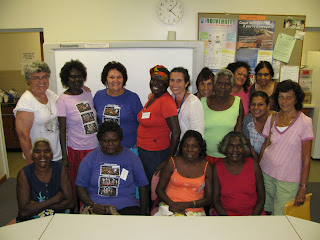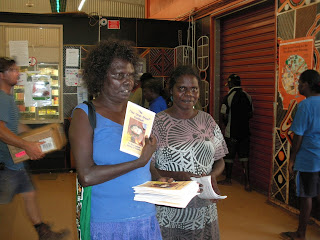Back in 1996, after returning from my first trip to Africa
with just $50 in my pocket, I decided to try a bit of ‘bush’ nursing. Within a
week of making a phone call I found myself in the middle of Western Australia -
Alice Springs was 1000 km in one direction and Kalgoorlie was 990km in the
other – with 400 Aboriginals and a handful of whites who were obviously just as
mad as me to want to live in the middle of nowhere with a long dirt road or the
weekly plane offering the only escape route! Cath Josif, whom I met on my first
day, remains a very dear friend, we have worked together in different locations
over the years and have regular face book chats even 1000’s of kilometers apart.
This was Warburton, just off the Gun Barrel, which if you
are a Midnight Oil fan you will be familiar with from their Blue Sky Mine album
(they did visit and play at the school during one tour). It was the largest
settlement for hundreds of miles!
I ensconced myself in the ‘baby clinic’ as, up to then, the
only adults I had ever looked after were pregnant women.
A lot of my time was spent talking to mothers about infant
and child nutrition. I had a television and a collection of videos, some I
found in the clinic and several that a friend in Darwin had sent me. There were
two that we loved and played over and over. One, at least 10 years old, featured
an old man from a community way up on the coast of Northern Territory. His name
was Dick Yumbal and he talked for hours about his traditional bush farming and
his ‘numbers and numbers of watermelons’.
The other video was about an amazing group of Aboriginal
women, again in the north of NT, who had come together to work with the young
mothers in their communities in an effort to improve antenatal and infant
nutrition and health. They had put together a program taking the best of
traditional knowledge and ways but also taking into account scientifically
proven ideas relating to pregnancy, child birth and infant care. The program
was called ‘Strong Women, Strong Babies, Strong Culture’. We watched the video
so many times we did not need to have the sound turned up, we knew it off by
heart!
January 1999, I found myself in Darwin. Again, after a few
phone calls, within days I was on my way out to a small island called
Milingimbi for a 3 month contract…………………I finally left 5 years later.
A larger population, just over 1000 at the time, on a
tropical island with the sea literally lapping at the clinic door, it could not
have been more different to my WA desert experience.
I walked into the clinic for my first morning of work and,
there they are! I am face to face with at least three women from the video I
have been watching everyday for years! It is weird, I feel as if I know them so
well.
As I spent a lot of time again in the baby clinic (0-5
years) I worked closely with the Strong Women over the next 5 years and
developed an enormous respect for them and the program as well as wonderful
friendships including their District Coordinator, Marlene, who would come every
month or so to visit. They were and still are so dedicated to their community
and culture.
I also eventually met Dick Yumbal. I was sent across to the
mainland to Ramingining, for a few weeks and he was still growing his numbers
and numbers of watermelons and was quite pleased he was famous in the Western
Australian desert.
The SWSBSC Program has been through many ups and downs over
the years. It started as an independent program and then had to adjust to being
part of the Department of Health. My opinion on this move has wavered over the
years. In some ways it made things easier for the women, being part of the
health team in each community, however, in many ways it greatly reduced their
autonomy over the way they ran the program and also having to deal with the
beaurocracy of a government department was a massive learning curve which
changed some vital aspects of the program.
I was very closely involved with the women during this time.
On a visit home, I called into the office of my friend Karen.
Of course I was always ready to consider any short term work that might be on
offer. She took full advantage of my situation and I returned to Kenya to pack
up my house and my cat and returned to Darwin for 18 months as the Project
Officer working on bringing the recent evaluation recommendations for the
SWSBSC Program and the Community Child Health Worker Program (which I had set
up 5 years earlier) to some sort of fruition.
It was in fact my dream come true, the ultimate peak of my
career! To be working directly with Marlene, Barbara and the ladies in the
program. It was also a very challenging time. Trying to fulfill my contract
commitments whilst remaining true to the original objectives and vision of the
program. The reality being the program had survived so far on their own and
although there had been ups and downs the women knew exactly the direction they
wanted to take and how to get there. Sometimes we have to step back and admit
that our terribly organised, professional ways are not the most suitable in all
situations. There are times when traditional, less obvious methods and
approaches, may take longer to meet the goal but they are more appropriate.
Of course the best part of the job for me was traveling out
to the communities and spending time with the SWSBSC workers during their
working day. I also wanted to get as much recognition as possible for the women
and their work. There were still people in the department who did not know
really what the SWSBC role was. We started a news letter, featuring different
workers each issue, the work they were doing, any special events and updates on
the program. By the end of my time we had a mailing list of over 250 people all
over the country.
Last week I received an email from Marlene. It was sent to a
group of us who have been connected with the program over the years. The
program is 20 years old and the women had been invited to parliament house as
part of the celebrations. Very few of the original women are still alive. But
the fact that we are celebrating 20 years shows the firm foundation on which
they originally built has survived the test of time. The program remains ‘owned’
by the women and the families that they work with and has outlived many other
attempts at health education style programs. The positive effects and results
of their work have been written up in nutritional and medical journals; they
have been invited to speak at conferences across the world; and they have been
invited to communities across Australia and Asia to introduce the ideas of the
program to other indigenous women’s groups.
Every so often I toy with the idea of bringing Marlene and
some of the women to Kenya and introducing them to different communities I have
worked with over the years. The problems faced here and the political and
social situation are very different but I guess one objective that would be achieved
would be giving the women in villages here the opportunity to see that if you
have the belief and determination to change problems being faced by your
community, it can be done.
http://www.youtube.com/watch?feature=player_detailpage&v=DTI7Agc8HPs
http://www.youtube.com/watch?feature=player_detailpage&v=wz7P2sKPkjI
Everyone in Darwin for a week of orrientation to the health department
Marmalade campaigning outside the local store, Tiwi Islands
Nutrition education, Milingimbi style.



No comments:
Post a Comment